RET Int’l Completes Campaign on Anti-Human Trafficking
Human trafficking is a global problem that governments are trying to control, if their efforts to stomp it out are overwhelmed by people’s economic reality. Today, RET International formally completed an awareness campaign among persons who work in the transportation industry and launched a training module as a guide to individuals who want to enroll in a course at U.B. on the topic. Today News Five’s Marion Ali was present for the closing ceremony and filed this report.
Marion Ali, Reporting
Key individuals who work in the transportation service industry were part of a training on anti-human trafficking to teach them to look for signs of activity around them. It included the participation of over five hundred persons across the country. Joshua Muñoz, who is the monitoring and evaluation officer for RET International, said it took the form of a train- the -trainers who then shared their skills. Taxi and bus drivers were included in the campaign, and a module was used to capture the key areas of concern.
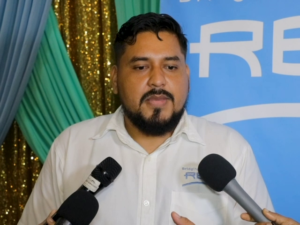
Joshua Munoz
Joshua Munoz, Monitoring & Evaluation Officer, RET Int’l
“We had to condense the module itself just enough to the four elements to give a short presentation between fifteen to thirty minutes and to ensure to pass on that information to them so they could understand how trafficking and how the transportation itself is vulnerable to human trafficking and how they themselves may be without their even their knowledge, might be assisting in terms of transporting persons from one who might be victims of trafficking from one place to one location to the other.”
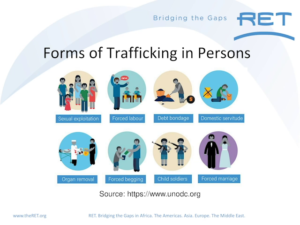 As a part of the campaign, the University of Belize has signed on to offer an e-course on human trafficking, using the module in digital form, for anyone who wants to register. It gives insight on what the crime is and how one can help to counter it.
As a part of the campaign, the University of Belize has signed on to offer an e-course on human trafficking, using the module in digital form, for anyone who wants to register. It gives insight on what the crime is and how one can help to counter it.
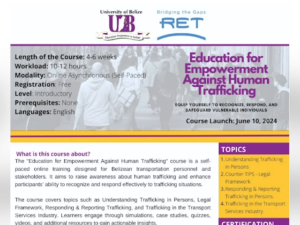 Joshua Munoz
Joshua Munoz
“It goes in detail in terms of what is human trafficking and as well how the transportation industry itself. With this partnership we have with the University of Belize, we’re going to continue advertising the e-course module, so that anyone can register, sign in and get their certification with this e course module itself. If you’re getting a phone call at 10 o’clock at night and you want, they want the person to transport you from the border, or from one part of the district to the next part of the district, that should be a cause of alarm. And so those are the things that we try to bring awareness to them.”
Kamesh Chivukula is the U.S. Embassy’s political officer in Belize. He is also the grants officer for the CARSI Grants Program, which funded this project. He hopes that the campaign will help reduce the incidences of human trafficking in Belize.
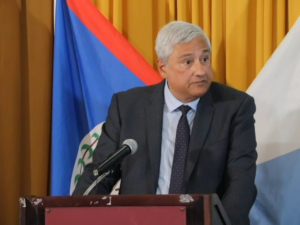
Kamesh Chivukula
Kamesh Chivukula, U.S. Embassy
“This particular project was designed to enhance the capacity of all the stakeholders, especially in the transportation industry, to identify and report suspected cases of human trafficking. The transportation industry plays a significant, it’s a significant link in the chain of trafficking and it’s the training that was conducted as part of this project, we hope will play its part in reducing or breaking that chain.”
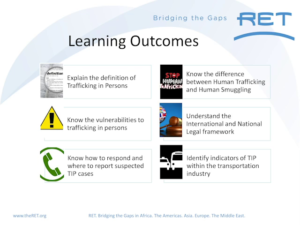 The reality is, however, that many of the persons in the transportation service industry assist in transporting victims of human trafficking because of the nature of their job. RET Country Representative in Belize, Cherese Ferguson is hopeful that the collaboration of the law enforcement authorities will help to put a dent in that practice.
The reality is, however, that many of the persons in the transportation service industry assist in transporting victims of human trafficking because of the nature of their job. RET Country Representative in Belize, Cherese Ferguson is hopeful that the collaboration of the law enforcement authorities will help to put a dent in that practice.

Cherese Ferguson
Cherese Ferguson, RET Country Representative, Belize
“These persons are not in offices for their eight to five, they are on the move. They have they work on shift. And so we had to be creative in reaching or target audience. We may not be able to stop it 100%, however, because we know that they are vulnerable to being used, and maybe some of them have been participating in facilitating trafficking, that’s why it was important for us to target this population. So they have the information, and the key part of our training that we highlighted was the law. The anti-trafficking prohibition act, which outlines the offenses and the penalties for those so that if they’re knowledgeable, if they’re culpable in participating in this act, they know what the consequences will be.”
The campaign was conducted for twenty-one months. Marion Ali for News Five.







Facebook Comments